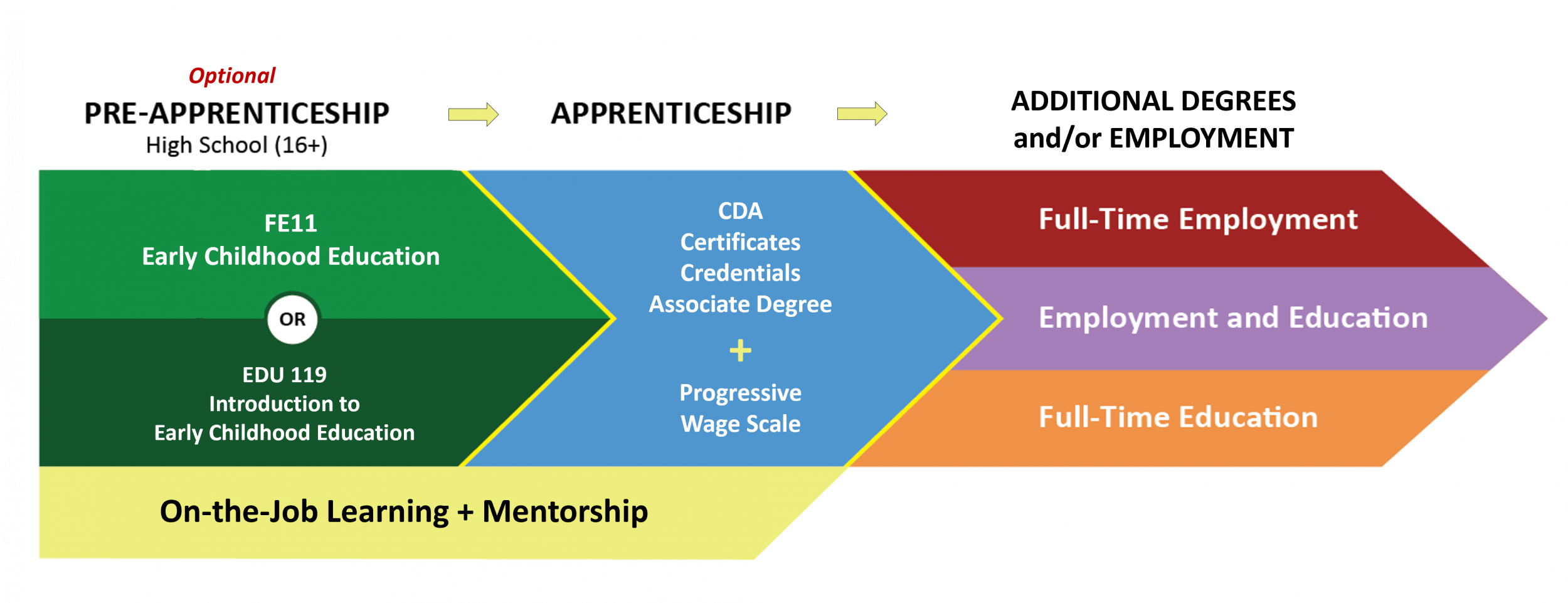<<< Back to the September 2023 Newsletter
Apprenticeships in early childhood education are quickly gaining popularity across the country as a way to address the need for high quality educators – and for good reason. Apprenticeships offer a supportive path for students to receive a quality education while gaining paid, hands-on experience in an early child care setting. For child care centers, apprenticeships serve as a valuable recruiting, training, and retention tool, with access to dedicated workers who are simultaneously gaining the skills and education necessary for career success.
Components of a Registered Apprenticeship Program
ApprenticeshipNC is the state’s apprenticeship agency that registers apprenticeship programs and is part of the North Carolina Community College System. ApprenticeshipNC has a network of consultants and coordinators across the state who work with the apprenticeship sponsor to develop a registered agreement. Apprenticeships are designed to be employer-driven, customizable, and flexible, resulting in an agreement that reflects the sponsor’s needs.
There are three components to a registered apprenticeship program. Once these are identified, an agreement is developed and approved by ApprenticeshipNC.
How ECE Pre-Apprenticeships Work
Pre-apprenticeships in early childhood education are optional and open to high school students who are at least 16 years old. Pre-apprentices typically sign on to the NC Department of Public Instruction’s statewide agreement. As seen in the graphic below, a pre-apprentice must take the Early Childhood Education course at their high school (Child Development is a prerequisite). In cases where these classes are not offered at the high school level, students can take EDU 119 through their local community college as part of the Career and College Promise (CCP) program. Pre-apprentices taking these classes are also gaining valuable hands-on experience in an early child care setting as part of the work-based learning component.

While a pre-apprenticeship is not a prerequisite to apprenticeship, one major benefit of pre-apprenticeship is access to the NC Community College System’s tuition waiver, which waives tuition at a community college for courses up to a full associate’s degree. To be eligible for the tuition waiver, a pre-apprentice must enroll in a registered apprenticeship program within 120 days of their high school graduation date.
Post-Apprenticeship Opportunities
Apprentices who complete the apprenticeship program receive Journeyworker Credentials from both the U.S. Department of Labor and the State of North Carolina. There are countless career and educational options following the completion of an apprenticeship. An apprentice may choose full-time employment, pursue further education, or a combination of both. In fact, last month the State Board of Community Colleges signed a transfer agreement with the North Carolina Independent Colleges and Universities (NCICU). The agreement provides those with an Associate’s Degree in Early Childhood Education a guaranteed transfer process to a participating college or university, where they can earn a Bachelor’s Degree in Birth-Kindergarten (BK) teaching licensure program or a Bachelor’s Degree in a related area of Early Childhood Education. Building Bright Futures works closely with ApprenticeshipNC to support registered apprenticeships and pre-apprenticeships. For questions about ECE apprenticeships or BBF, or to get started with a registered apprenticeship program, contact morgan.ford@nc.gov or megan.johnson@nc.gov.
Additional Resources:
Glossary of Common Apprenticeship Terms
Child Care Services Administration’s (CCSA) Career Directory
ApprenticeshipNC’s Registration Process Overview
September 2023 Newsletter Article